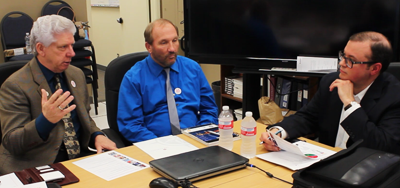 Describing the situation as a “perfect storm,” the President of Lee College in Baytown says the school is constantly innovating and working closely with the business community to fine-tune programs in an effort to meet the demands of employers and help students seeking to improve their lives.
Describing the situation as a “perfect storm,” the President of Lee College in Baytown says the school is constantly innovating and working closely with the business community to fine-tune programs in an effort to meet the demands of employers and help students seeking to improve their lives.
Construction Citizen’s team recently had a chance to sit down with the leadership of Lee College and the discussion was eye-opening. Administrators described a community-wide partnership aimed at putting people to work in solid careers – even if those careers aren’t “glamorous” or even top-of-mind for people who live in the heart of the petrochemical corridor along the Texas Gulf Coast.
A wave of retirements in the petrochemical industry is one of the many reasons Lee College is in the center of that “perfect storm,” according to President Dennis Brown. “They need people to operate these facilities once they're completed,” Brown said. “But most desperately they need folks who have the craft skills ...to do the construction work to build these plants.”
That’s why people with training in pipefitting, welding, carpentry, electrical, and other related trades are in extremely high demand and can fairly quickly be in jobs where they earn six figure salaries.
"How many do they need? They need a lot. When do they need them? They need them yesterday," Brown said. “It's no secret that you can make $100,000 as a welder," Brown said, but added many people think of these jobs in the way they existed decades ago. These may not be the kind of “glamourous careers that some other folks want, but they pay very well,” Brown said.
Filling those positions can be difficult, in part, due to a lack of education about the many ways in which the industry has made improvements in safety and overall treatment of its craft professionals. Industry leaders will tell you that those employees are their most valuable asset.
One thing that “floored me,” Brown said, is the fact that it is not uncommon for people who hold four-year degrees to enroll in a community college for a two-year program.
"Seventy-nine folks were here this past spring who already have four-year degrees,” Brown said. Those students were simply on a career path that didn’t turn out to be anywhere near as lucrative as they had hoped. "They have now seen that there's another option for them and that is to come back and get a two-year technical degree," Brown said.
Debi Jordan, Executive Director of Workforce and Community Development, said Lee College is “historically grounded in technical education” and has moved quickly to “keep up with technology.”
Jordan said local leadership has embraced a collaborative approach to addressing workforce issues. Three years ago, the mayor of Baytown formed a workforce preparedness partnership, including officials from the city and county, the school district, Lee College, and industry executives. Many solutions have been born out of partnerships with companies like Chevron and Exxon Mobil, Jordan said.
For example, Lee College has a remarkable “fast track training” option that allows students to gain critical skills in mere weeks.
The idea is straightforward: “[The unemployed] have plenty of time on their hands so let's use that time to put them through training quicker," Jordan said. “It's a pretty robust schedule," she said. “We don't just talk about what it is they need to do. We actually get them out there and get their hands on it and make sure they have some good technical experience.”
For students who struggle financially, there are various types of help available to ensure they get on their feet and become self-sufficient.
Dr. Christy Ponce, the Vice President of Student Success, Resource Development and Workforce, said there’s a foundation board that’s raised more than $10 million to award in student scholarships. "Letting them know that there's other financial support that can help them eliminate other barriers," Ponce said.
A perhaps ironic challenge faced by Lee College is a difficulty in recruitment of teachers for some of these courses, said Dean of Applied Sciences Layton Childress.
Good candidates for instructors are ideally people with industry experience, but the college can’t often pay enough to lure those folks out of the industry. Many are compensated so well in industry that working in a classroom becomes less attractive, Childress said. "I've never seen such demand where the jobs are there and the salaries are so high," Childress said.
"They don't even realize what an opportunity they have here to go to school for two years and then be set for life,” Childress said.


